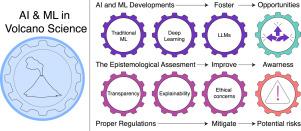Opportunities, epistemological assessment and potential risks of machine learning applications in volcano science
IF 4.2
引用次数: 0
Abstract
This manuscript explores the opportunities and epistemological risks of using machine learning in the Earth sciences with a focus on igneous petrology and volcanology. It begins by highlighting the benefits of machine learning, particularly in automating tasks, enhancing modelling strategies, and accelerating knowledge discovery. However, the integration of machine learning into scientific research also introduces significant challenges. Key concerns include understanding what machine learning models learn, ensuring transparency, reproducibility, and improving model interpretability. These issues become especially critical in high-risk contexts such as volcanic hazard assessment, risk mitigation, and crisis management, where the reliance on machine learning outcomes can have profound consequences for human lives. The manuscript also introduces additional ethical considerations, such as the risk of over-reliance on machine learning models and the broader implications of geopolitical development plans, laws and regulations in the EU, China, and the US.

火山科学中机器学习应用的机会、认识论评估和潜在风险
本文探讨了在地球科学中使用机器学习的机会和认识论风险,重点是火成岩岩石学和火山学。它首先强调了机器学习的好处,特别是在自动化任务、增强建模策略和加速知识发现方面。然而,将机器学习整合到科学研究中也带来了重大挑战。关键问题包括理解机器学习模型学习的内容,确保透明度、可再现性和提高模型的可解释性。在火山灾害评估、风险缓解和危机管理等高风险环境中,这些问题变得尤为重要,在这些环境中,对机器学习成果的依赖可能对人类生命产生深远的影响。该手稿还引入了额外的伦理考虑,例如过度依赖机器学习模型的风险,以及欧盟、中国和美国地缘政治发展计划、法律法规的更广泛影响。
本文章由计算机程序翻译,如有差异,请以英文原文为准。
求助全文
约1分钟内获得全文
求助全文

 求助内容:
求助内容: 应助结果提醒方式:
应助结果提醒方式:


